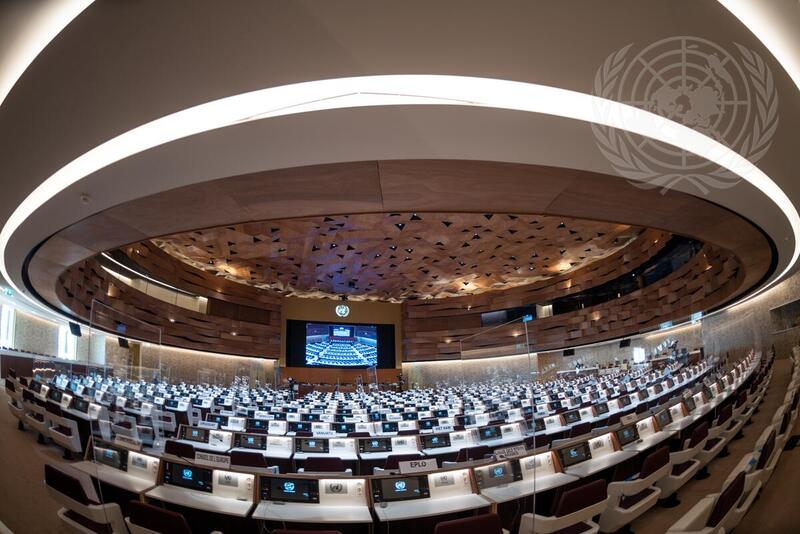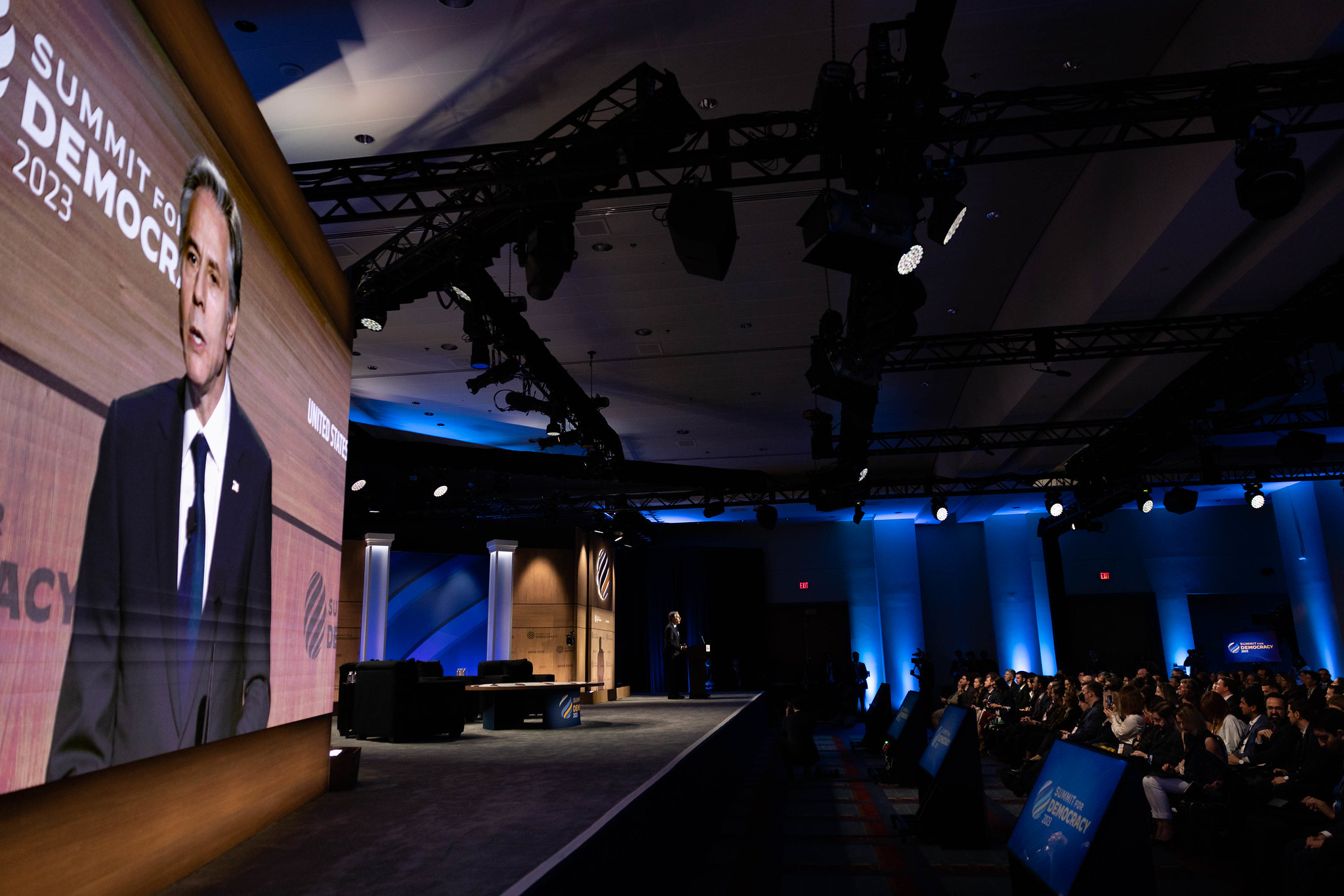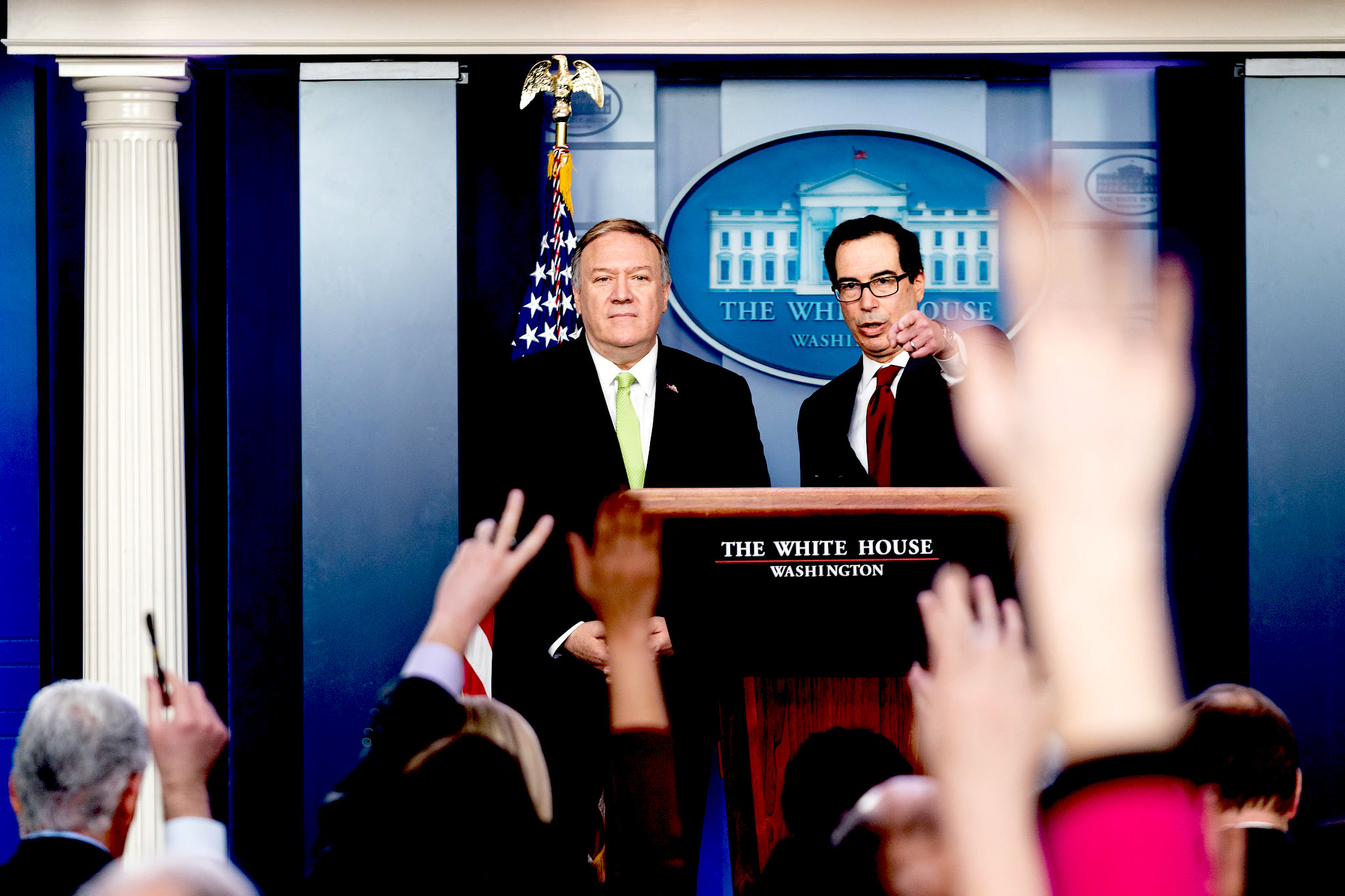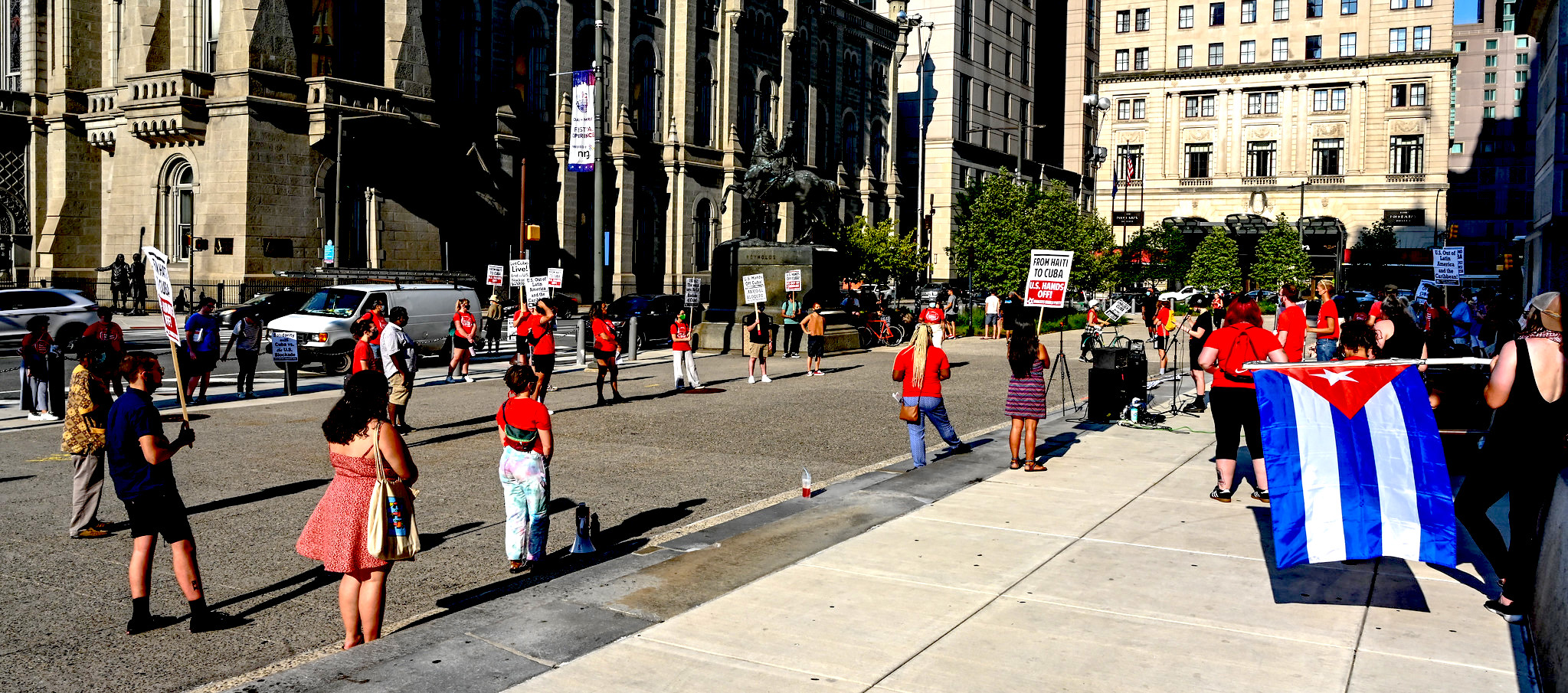Azerbaijan presented the resolution on behalf of the Movement of Non-Aligned Countries earlier this week, People’s Dispatch reports. It passed with 33 votes in favor and was predictably rejected by the U.S. and its allies.

U.N. Human Rights Council room in Geneva. (U.N/ Photo/Jean Marc Ferré)
The United Nations Human Rights Council (UNHRC) adopted a resolution this week that condemns the “negative impact of unilateral coercive measures on the enjoyment of human rights.”
Azerbaijan presented the text titled A/HRC/52/L.18 on behalf of the Movement of Non-Aligned Countries.
Emphasizing that unilateral coercive measures, legislation and secondary sanctions were a violation of international law, norms and principles as well as the U.N. Charter, the text expressed “grave concern” over the negative impact of sanctions on human rights, including the right to development, which is recognized as a “universal and inalienable right” integral to all human rights.
[The U.N. charter permits multilateral sanctions approved by the U.N. Security Council.
The U.S. has imposed unilateral sanctions on Cuba, Venezuela, Iran, North Korea, Libya, Belarus and other nations. The vote by the Human Rights Council can be seen as part of the accelerating trend of the developing world moving away from the West after it rejected Western sanctions on Russia over Ukraine. ]
The resolution called upon all states to “stop adopting, maintaining, implementing, or complying with unilateral coercive measures…in particular those of a coercive nature with extraterritorial effects.”
The draft resolution was approved with 33 votes in favor, 13 against, and one abstention. Among the countries that rejected the text were, predictably, the United States and several of its NATO allies including the United Kingdom, Belgium, France, Finland, Germany, alongside Ukraine.

U.S. Secretary of State Antony Blinken addressing the Summit for Democracy on March 30 in Washington. (State Department)
Meanwhile, the debate preceding the vote saw interventions from members of the Council, particularly Eritrea, which has long resisted the unilateral sanctions imposed on it by countries including the U.S.
“Unilateral sanctions are brutal and inhumane by their very nature and they collectively punish and undermine national socio-economic progress,” said Adem Osman Idris, Eritrea’s permanent representative to the U.N.
“These powers that give lip service to [a] rules-based international order use unilateral sanctions [as] forms of warfare [to] bully and intimidate those nations that pursue independent national policies and programs to the benefit of their people,” he added.
The resolution stresses that
“no State may use, encourage or threaten to use any type of measure, including but not limited to economic or political measures, to coerce another State in order to obtain from it the subordination of the exercise of its sovereign rights, and to secure from it advantages of any kind.”

Jan. 10, 2020: U.S. Secretary of State Mike Pompeo and Treasury Secretary Steven Mnuchin during a press conference to announce an executive order authorizing new sanctions against Iran. (White House/ Andrea Hanks)
The text also reaffirms the principles of the “sovereign equality of States, non-intervention and non-interference in their internal affairs and freedom of international trade and navigation…,” and that each state has “full sovereignty over the totality of its wealth, natural resources, and economic activity, exercising it freely.”
The resolution drew attention to the “disproportionate and indiscriminate human costs of unilateral sanctions” and their impact on basic rights including the right to life, access to health care, right to freedom from hunger, and the right to an adequate standard of living, food, education, work, and housing.
Clear examples of this include the over 60-year-long brutal blockade of Cuba, which the U.S. has designated as a “state sponsor of terrorism,” and the sanctions on Venezuela that the U.S. continues to keep in place citing a threat to its national security. A current member of the UNHRC, Cuba, was one of the countries that voted to adopt Monday’s resolution.

Rally in Philadelphia to end the U.S. blockade on Cuba, July 26, 2021. (Joe Piette, Flickr, CC BY-NC-SA 2.0)
“Coercive measures” have been linked to multi-fold increases in food insecurity, economic and trade collapse and poverty, and the denial of life-saving treatments and medications to vulnerable populations.
Despite the U.S.’ repeated claims that its sanctions policies contain “humanitarian” exemptions, reports and evidence, including from the U.N., have proved that this is false.
The resolution noted the impact of widespread compliance and over-compliance to sanctions by entities including financial institutions and transport companies that are necessary for the provision of humanitarian aid.
U.S. sanctions have actively impeded aid and rescue efforts in the aftermath of major disasters, which was clearly visible most recently in the aftermath of the deadly earthquakes that struck Turkey and Syria.
Sanctions have often been described as a form of “economic warfare” and collective punishment — a means to undermine the sovereignty of an “enemy” country without direct military intervention.
Monday’s resolution condemned the use of sanctions as “tools of pressure…particularly against least developed and developing countries, with a view to preventing these countries from exercising their right to decide, of their own free will, their own political, economic, and social systems.”
This article is from Peoples Dispatch.
The views expressed are solely those of the author and may or may not reflect those of Consortium News.

Can we put sanctions against all the Israeli citizens for committing crimes against those Palestinians celebrating Ramadan.?? Does that work? No more subsidies. No more secret deals. Release those imprisoned in Gaza or the sanctions will include the wealth of Israel. Does that sound fair?
What does its passing actually mean for UN approved sanctions already in place? Anything? Does this now go to the General Assembly for a vote?
This resolution is not about UN sanctions but unilateral sanctions imposed by one country on another such as the US imposes.
I’m no lawyer, but since unilateral sanctions are de-facto acts of war: I would think that they blatantly violate the UN charter, Nuremberg legal precedents, and other international agreements/treaties. Since the US has ratified numerous international agreements that deem unilateral sanctions illegal, this appears to be yet another example of the US making a mocker of the rule of law.
Vive Azerbaijan. Sanctions are warfare. If you oppose war, you oppose sanctions too.
“Nizar Nayouf is living proof that it is worth signing petitions, supporting human rights organisations and writing to faraway dictators.
After nearly a decade in Syrian prisons, Nayouf was freed by President Bashar al-Assad when Pope John Paul II went to Damascus in May 2001, armed with letters from Amnesty International, Reporters Without Borders and other groups.
[…]
Today, Nayouf publishes an online magazine called Al Hakikah (The Truth).
He is completing a 20-year investigation into the Syrian regime’s past use of prisoners as guinea pigs for chemical and biological weapons, sometimes with Western complicity [as with the comparable case of Maher Arar – see David Cole, “Can Obama Say He’s Sorry?,” The Nation, May 21, 2012].
[…]
‘The Americans created mass graves, not democracy. Democracy cannot happen in Syria in the foreseeable future. It would be like Iraq. The present situation is better than blood flowing in our streets.’
Through long access to sources within the military and intelligence establishment, Nayouf has collected what he calls ‘the most dangerous archives of Syria.’ He distrusts intensely the Western intelligence agencies that court him. ‘They are very dirty; all like each other. They are criminals,’ he says.
[…]
The least bad option, Nayouf says, is for UN agencies, the European Parliament and human rights groups – ‘not hypocritical states’ – to continue to press for an end to ill treatment, respect for fundamental rights and the release of political prisoners. ‘But to change the regime by force? No. I don’t want to see Syria destroyed.'”
Source:
Lara Marlowe, “Democracy in Syria Would Be Bloody ‘Like Iraq,'” The Irish Times, August 31, 2007
I have my doubts about the Syrian regime’s past use of prisoners as guinea pigs for chemical and biological weapons. Sounds like more of the same, the Anglo-Saxon propaganda and false flag operations the Dirty (aka White) Helmets. David Cole’s ACLU sold their soul to neocons and deep sate ever since he got infected by TDS, like the rest of the world’s liberal intelligentsia. Nazir Nayouf – a recipient of generous western support evolved from a dissident into a war criminal giving credence to the neocon’s theory justifying the illegal invasion of Iraq, claiming the knowledge of the whereabouts of the infamous stache of the WMD. The Source – the ever-trustworthy Wikipedia.
While it is true that Nizar Nayouf has on isolated occasions furnished accounts that may incidentally reinforce narratives favoring US-coordinated “regime change” efforts in the region (such as his claims regarding covert transfers of chemical and biological weapons supplies to Syria from Iraq preceding the 2003 invasion, a possible scenario incorporated into the 2004 Duelfer Report), the overall thrust of his career as a dissident does not lend me to believe that he is a pliant tool of Western propaganda.
For example, he was among the first to expose the early mobilization of NATO forces massing along the Jordanian border with Syria to train jihadist-permeated armed opposition forces against Assad (“Hundreds of US-NATO Soldiers Arrive and Begin Operations on the Jordan-Syria Border,” Centre for Research on Globalization, December 11, 2011), which would quickly be corroborated by reportage from the Syrian Arab News Agency, WorldNetDaily, and the Likudnik intelligence site DEBKAFile, and would later be confirmed by The Guardian and Der Spiegel fifteen months later (see Julian Borger and Nick Hopkins, “West Training Syrian Rebels in Jordan,” The Guardian, March 8, 2013). He has also critiqued certain Amnesty International claims about Syrian human rights abuses that he contends are erroneous (see As’ad AbuKhalil, “Amnesty Internation Report on Syria: A Response from a Syrian Dissident (Former Political Prisoner Living in Europe),” The Angry Arab News Service (Blogspot), February 8, 2017), and complicated the mainstream account of Khan Sheikhoun in 2017 (see Nabih Bulos, “Here’s Some of What We Know About the Apparent Chemical Weapons Attack in Syria,” Los Angeles Times, April 6, 2017).
Additionally, note that his allegations outlined in Marlowe’s article do not reflect positively on Western states either (exposing the reality that the West is also culpable for Syria’s acknowledged but almost certainly abandoned chemical weapons program, in addition to their complicity with its torture regime – for instance, see Cahal Milmo, et. al., “Revealed: UK Government Let British Company Export Nerve Gas Chemicals to Syria,” The Independent, September 3, 2013). Moreover, Nayouf’s statements here were delivered at a time when the United States, the United Kingdom, and other countries were attempting an abortive diplomatic rapprochement with Ba’athist Syria (see Nafeez Ahmed, “The Syrian Terror Trap,” INSURGE Intelligence, October 20, 2015, and “Former UK Ambassador Reveals Truth About Syria: Ron Paul Interviews Peter Ford,” Ron Paul Liberty Report / Antiwar.com, April 19, 2018).
As an aside, even if everything that Colin Powell had been saying at the United Nations was hypothetically true (i.e., the WMD components that were supplied to Saddam Hussein’s Iraq by the United States and its coalition partners in the first place per the 1994 Riegle Report, and then used in chemical warfare to target Saddam’s military opponents with the aid of CIA-supplied IMINT during the Iran-Iraq War, had not actually been dismantled), and I am not inclined to believe that it was, that still would not have justified the invasion of Iraq, nor did it justify the previous post-Gulf War decade of what former US Attorney-General Ramsey Clark deemed “genocide by sanctions,” as far as I am concerned – I do not believe sanctions should be a punitive instrument of statecraft, as I elaborated in more detail around a year ago (see my comments on the following article: Joe Lauria, “Biden Confirms Why the US Needed This War,” Consortium News, March 27, 2022).